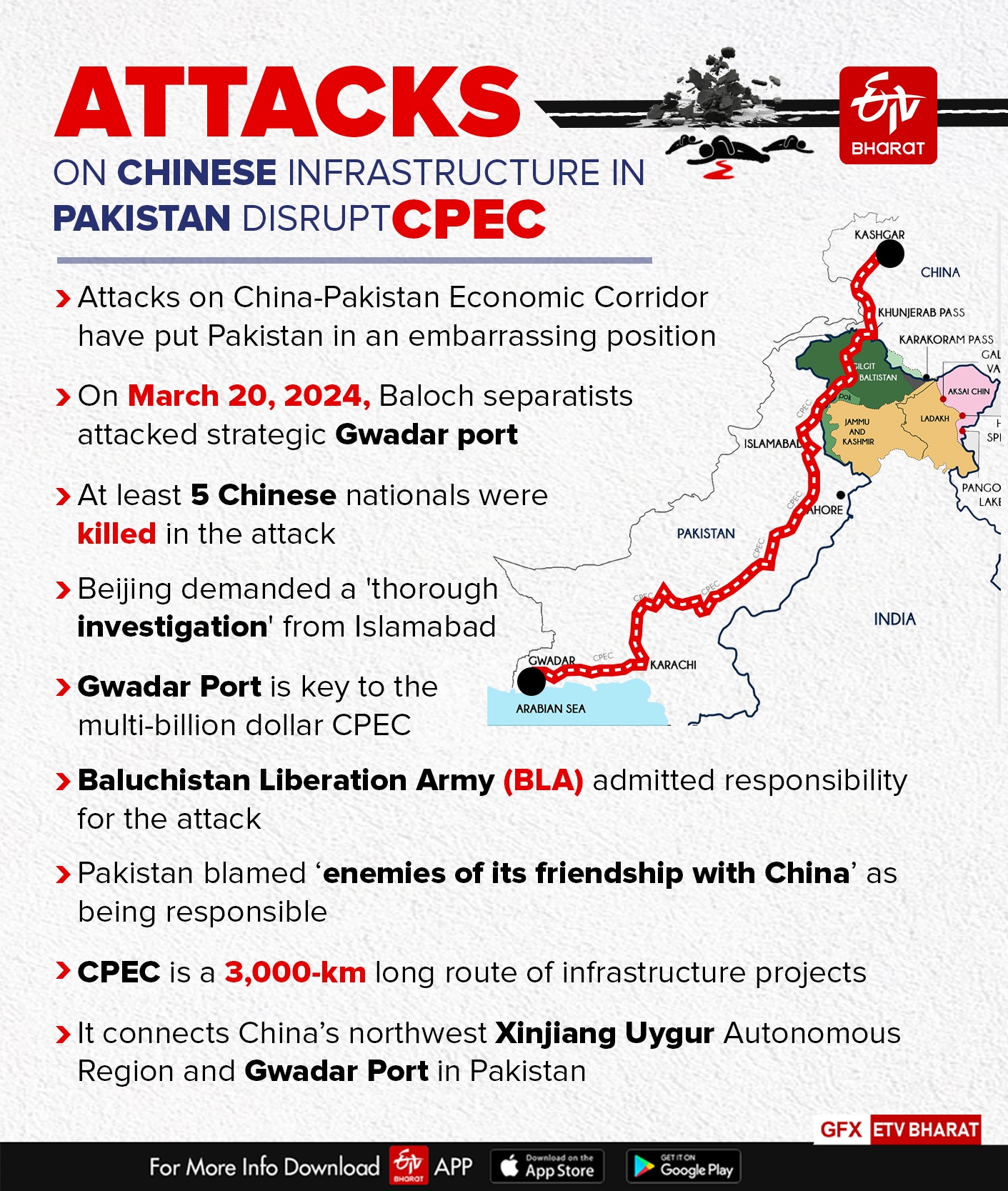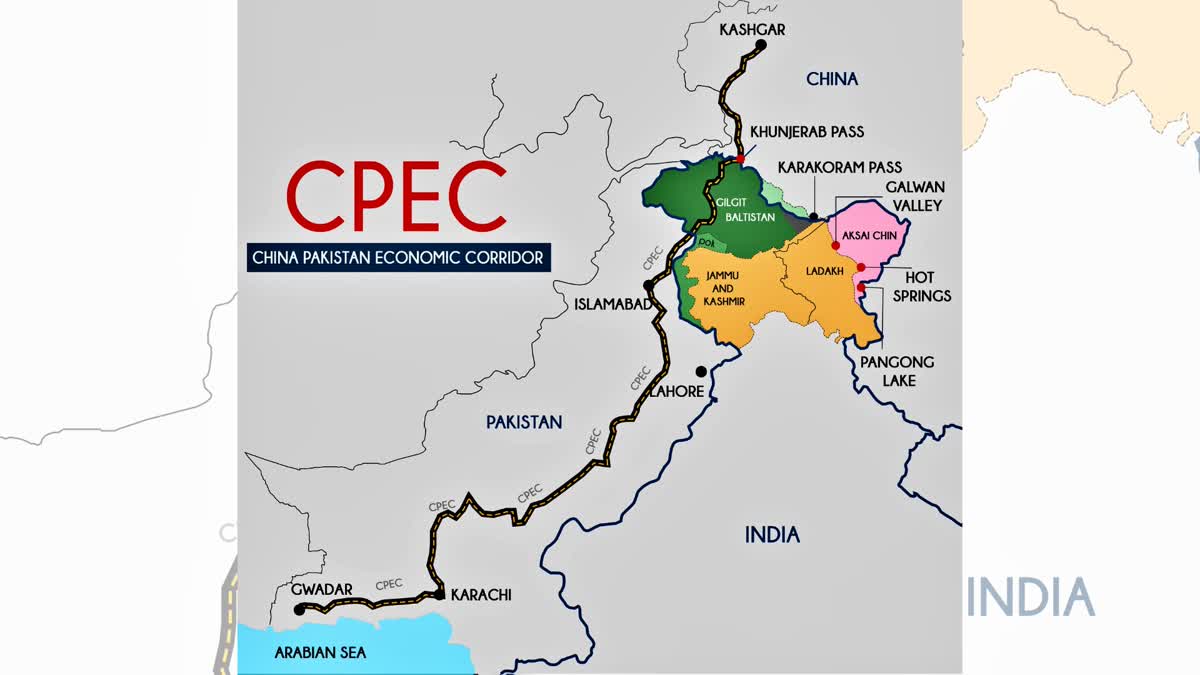Increase in attacks on installations and workers linked to the China-Pakistan Economic Corridor (CPEC) have added to tensions between the two countries as also its continuity. These include the Baluchistan Liberation Army (BLA) strikes on Gwadar (being built by the Chinese) and Pakistan’s naval base in Turbat, as also the suicide attack on Chinese engineers in Shangla, a district in Khyber Pakhtunkhwa (KP), in the country’s North West. The engineers were moving from Islamabad to the hydel power project in Dasu. Five Chinese engineers and their local driver were killed in the suicide strike.
Targeting Chinese
While the BLA admitted responsibility for the strikes on Gwadar and Turbat, no terrorist group claimed responsibility for the attack on the Chinese. For Pakistan, the most serious incident was that involving Chinese engineers as it drew an angry response from Beijing. The Chinese are regularly targeted in Pakistan.
China demanded that the ‘Pakistani side conduct a thorough investigation into the attack and punish the culprits severely.’ The Chinese spokesperson in Beijing added, ‘No attempt to sabotage the CPEC will ever succeed.’ The Pak PM and President visited the Chinese embassy in Islamabad and offered condolences, hoping to ease the growing discomfort of Beijing.
'China's Enemies Involved'
As expected, Pakistan blamed ‘enemies of its friendship with China’ as being responsible. Pakistan’s military released its own statement, ‘Certain foreign elements are complicit in aiding and abetting terrorism in Pakistan, driven by their vested interests.’ It accused the TTP (Tehreek-e-Taliban Pakistan), a terrorist group backed by the Afghan Taliban, but the TTP denied any involvement. Recently, Pakistan had mentioned that the TTP is supported by India via Kabul, hinting towards India, aware that China-India ties are frozen.
China Joined Probe
The ramifications of the attack are already being felt. Chinese investigators have joined the probe, implying a lack of trust on Pakistan to conduct a thorough investigation. Chinese companies have suspended operations at the Dasu Dam, the Diamer-Basha Dam, and the Tarbela 5th Extension, laying off thousands of local workers.
Chinese nationals, currently employed in CPEC projects are shaken and many are contemplating returning. An exodus of Chinese workers occurred after the attack on its engineers employed in the Dasu project, in which nine were killed in Jul 2021. It took time before the Chinese were convinced to return and resume work.
Pakistan To Compensate
The Chinese have repeatedly raised the aspect of enhanced protection for its citizens working in Pakistan. In 2021, China demanded USD 38 Million as compensation for its nine killed engineers, which was beyond Islamabad’s ability to pay. Pakistan sought a review and final payment figures remain unknown.
Attacks In The Past
In Apr 2023, a Chinese engineer was accused of blasphemy. He was rescued by the police and subsequently repatriated. In August last year, a bus carrying 23 Chinese engineers was attacked. The Pak army neutralized the attackers, with no loss of Chinese lives. Earlier in 2021, a hotel in Quetta, which was expected to host the Chinese ambassador, was targeted. However, he was not present. A month later a suicide bomber targeted a bus killing three Chinese staff members of the China-built Confucius Institute at Karachi University. Each time, China demanded a thorough probe. The Pak army randomly picked up locals, forced confessions from them and put them behind bars.

Invoking 'Foreign Hand'
Pakistan has always hinted at a foreign hand behind attacks on the Chinese. Beijing is caught in a bind every time its nationals are killed. It cannot quit the CPEC as it has invested immensely into a project which is the showcase of its BRI (Belt Road Initiative). Hence, despite all losses and incidents, they continue to parrot proximity in ties. Simultaneously, visualizing that Pak has no ability to repay, Chinese projects are moving at a snail’s pace. Pakistan did gain some sympathy from friendly nations, including the US.
The Question Of Sovereignty
The attack will result in China again insisting on employing its own troops for the security of its citizens working on CPEC projects. Accepting such a decision would enhance costs for Pakistan as they would have to pay for Chinese security forces deployed in the protection role. It would also display that the Pakistan Army as incapable of ensuring security within its own nation.
Deployment of Chinese troops would violate Pakistan’s sovereignty as it would imply the provision of bases to the PLA. To add to the pressure on Islamabad meeting its terms and conditions Beijing would submit a hefty financial demand as compensation, again beyond the ability of Pakistan.
Beijing To Dictate Terms During Shehbaz's Visit
Shehbaz Sharif will be in Beijing in his first official visit abroad shortly. Dates have yet to be announced. The visit will result in a strong rap on his knuckles as also insistence on Beijing’s terms which may be difficult for Pak to accept. Shehbaz’s requests for additional investments and restructuring of debts may come with riders including implementing security measures which could be embarrassing for Rawalpindi.
Pakistan still considers itself a frontline state against terror, and as its military stated, ‘remains perhaps the only nation directly confronting the international terrorist enterprise with absolute steadfastness and full resolve of the state.’ However, it remains a homestead for multiple terrorist groups, which they term as ‘good terrorists.’ It is supporting terrorist groups which has marred its ties with all its major neighbours, Iran, Afghanistan and India, and led to Iran and Afghanistan turning a blind eye to bases of anti-Pak groups on their soil.
What It Means To Pakistan?
Pakistan’s overdependence on China and the CPEC has increased its vulnerabilities. Baluchistan, the major hub of the CPEC, exploited by Islamabad, but ignored in development, has a dissatisfied population, feeding into the BRAS (Baloch Raaji Ajoi Sangar), a combination of Baloch freedom groups. Its western provinces, including Baluchistan and KP, are almost ungovernable. The TTP controls large swaths of KP. Daily attacks on Pak bases by different militant groups is a matter of concern. The CPEC remains a prime target as it involves the Chinese, embarrassing the Pak army. It also brings additional pressure from China.
Further, locals believe that the projects are aimed at benefitting the quality of life in Punjab and Sindh and not their region. As Muhammad Amir Rana writes in The Dawn, ‘Many believe that dams and wider roads will trigger urbanization, women’s emancipation, and modernization, which they perceive as threats to their religion and culture.’
Pak has to build confidence amongst its populace of its intentions of building the CPEC, change its good and bad terrorist policies and remove cultural and religious fear amongst its populace. Unless it does so, its own armed forces and the Chinese involved in the CPEC will remain targets adding to Pakistan’s embarrassment.
Postscript
Another attack in Gwadar claimed two more lives. Simultaneously, the Pak army announced it has arrested 10 terrorists and facilitators of the attack on Chinese engineers in Shangla, including the main commander who is from the TTP. They stated that the suicide bomber was an Afghani. Most likely, innocents have been picked up and coerced to admit. The intent is obvious and has been the norm earlier too. Satisfy the Chinese and enhance pressure on Kabul while hinting towards India. It will have no impact on the Afghan leadership but will it satisfy the Chinese is to be seen.



